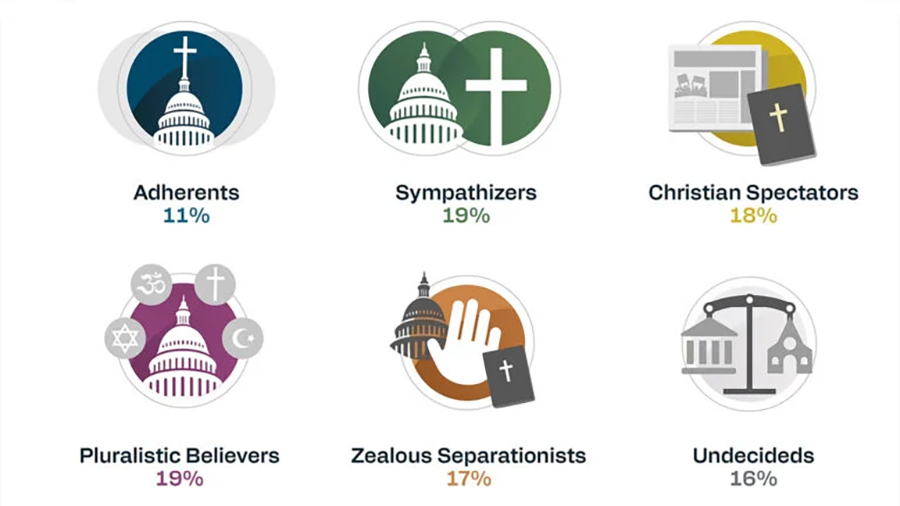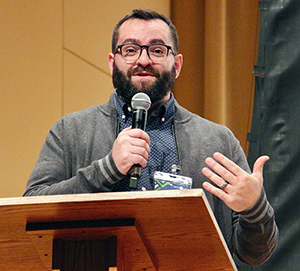How widespread is Christian nationalism? It’s complicated
WASHINGTON (RNS)—A new study estimates about 30 percent of Americans are open to the ideas associated with Christian nationalism. However, the study’s authors say those who adhere to or sympathize with the ideology are a more complex group than media portrayals and even other studies have found.
“Christian Nationalism: A New Approach” is the work of Neighborly Faith, an organization founded to help evangelical Christians build stronger relationships with people from other religious groups.
In a Dec. 18 webinar, Neighborly Faith researchers said they took a more detailed look at Christian nationalism than previous efforts, beginning with the criterion typically used to identify Christian nationalist leanings. Where most surveys ask six questions, the Neighborly Faith survey asked 14.
The six-question rubric, Neighborly Faith Director Chris Stackaruk said, makes it “very difficult to differentiate what is Christian nationalism versus what is socially or theologically conservative Christianity.”
In addition to the original six questions, Neighborly Faith asked respondents whether they believed America has a “special God-ordained purpose,” whether U.S. culture is “fundamentally Christian” and whether “Christian values” should be “solely and explicitly endorsed by the government.”
Neighborly Faith split respondents into six categories: Christian nationalist “Adherents” (11 percent) and “Sympathizers” (19 percent); Christian “Spectators” (18 percent) who sympathize with “traditional Christian views” but are less likely to engage politically; “Pluralistic Believers” (19 percent) who are more religious than the average American but oppose government endorsement of Christianity; “Zealous Separationists” (17 percent) who “strongly oppose” commingling of church and state; and “Undecideds” (16 percent).

‘A more nuanced look’
The researchers acknowledged some of their data closely matches a 2023 PRRI/Brookings survey that estimated 10 percent of Americans are Christian nationalist adherents and 19 percent are sympathizers.
But Neighborly Faith’s methodology, its researchers said, allowed for a more nuanced look at Christian nationalism using a definition calling it “a movement advancing a vision of America’s past, present, and future that excludes people of non-Christian religions and non-Western cultures.”

Kevin Singer, Neighborly Faith’s president, said its study showed Christian nationalists often “romanticize Christianity’s influence on America’s development” and believe the U.S. benefits from “God’s special favor.”
Other definitions of Christian nationalism take a harder line. Samuel Perry and Andrew Whitehead, authors of Taking America Back for God: Christian Nationalism in the United States, defines Christian nationalism as “a cultural framework that blurs distinctions between Christian identity and American identity, viewing the two as closely related and seeking to enhance and preserve their union.”
Amanda Tyler, of the Baptist Joint Committee for Religious Liberty, has charged that it “carries with it assumptions about nativism, white supremacy, authoritarianism, patriarchy and militarism.”
But Singer noted the Neighborly Faith study revealed adherents of Christian nationalism show surprising levels of support for some pluralistic ideals. While adherents were less likely overall to support the idea that the United States should take in refugees “even if I do not share the same beliefs as them,” for instance, more than half (51 percent) nonetheless supported welcoming refugees at some level.
What’s more, Christian nationalist adherents and sympathizers were roughly as likely as any other group (around 50 percent to 55 percent) to say they are moderately or very likely to participate in or attend events encouraging interfaith dialogue or understanding.
In a virtual panel discussion about the study, Kaitlyn Schiess, author of the forthcoming book The Ballot and the Bible: How Scripture Has Been Used and Abused in American Politics and Where We Go from Here, framed those findings as a hopeful sign for critics of Christian nationalism.
They point to “real inroads,” she said, for pastors and others concerned about the ideology to tap into a shared “desire to work across lines of religious belief for the common good.”
Troubling trends among Christian nationalists
Even so, Singer was quick to note troubling trends disproportionately are present among Christian nationalist sentiments and adherents.
“Our study is, by no means, saying that Christian nationalism is a preferable worldview to have or to endorse,” said Singer.
Christian nationalist adherents, researchers found, were the most likely to express the highest preference for a “strong leader who does not have to deal with Congress and elections” (37 percent), and more than half said the opposing party “lack(s) the traits to be considered fully human—they behave like animals.”
According to the study, adherents and sympathizers also “exhibit a tendency to dislike many outgroups, and prefer their government to favor Christianity over other faiths.”
Adherents in particular favor the idea of having Christian clergy review and advise on laws (59 percent) and having “America’s Judeo-Christian founding explicitly established in the Constitution” (49 percent).
The study also offers an unusually detailed profile of Christian nationalists. Adherents are 70 percent non-Hispanic white, for instance, and have the largest concentration of evangelical Christians (71 percent).
Among those who sympathize with Christian nationalist ideas, 60 percent say they are evangelicals, and adherents were also more likely to be married than others in the survey, by 62 percent to 49 percent.
Nonreligious individuals—those who said they were atheists, agnostics, nothing in particular, spiritual but not religious or “something else”—were the best represented among the Zealous Separationists—those who oppose fusions of church and state—comprising 65 percent of that group. Separationists also exhibited comparatively high levels of political participation, whether in protests or voter registration drives.
Political participation and voting patterns
Christian nationalist adherents and sympathizers, however, were only a few points behind separationists in political participation and collectively outnumber them. Adherents and sympathizers collectively represent 30 percent of the population nationally, whereas separationists represent 17 percent.
Roughly half of adherents also reported having shifted their buying habits due to a social or political issue, the highest of any group.
Christian nationalist adherents and sympathizers were also the most likely to say they voted for former President Donald Trump in 2020 and also more likely to have voted at all (67 percent and 68 percent, respectively) compared to other groups.
Separationists voted at 64 percent, however, and showed the highest support for any specific candidate (61 percent said they voted for President Joe Biden).
As for party affiliation, around 17 percent of the Republicans or those who lean Republican were classified as Christian nationalist adherents, with an additional 30 percent marked as sympathizers and 21 percent Christian Spectators.
On the Democratic side, 30 percent were Zealous Separationists, 25 percent Pluralistic Believers and 15 percent were Christian Spectators.
Neighborly Faith partnered with Technites for the survey, which was conducted between June 16 and June 21. It polled 2,006 U.S. adults and an oversample of 303 evangelical youth ages 18 to 25 for a total of 2,309 respondents.